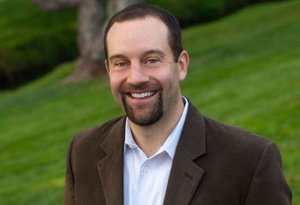Let's Get Real About Sexuality

Photo: Courtesy of Mike Robbins
PAGE 2
I'm glad that Ramin wrote the article, that Kristin responded and that it has been debated in the media, even though I believe it's has been reduced to superficial talking points, quoted out of context and addressed on the surface in many cases. I'm glad because this whole thing speaks to a larger issue in our culture, and specifically in the media, which is that we are not really having meaningful, vulnerable and real conversations about homosexuality. At least us straight folks aren't.
Instead, most of us have already picked our sides on issues like this. Whenever someone says or does something that contradicts what we think or believe (or what those on our sides think or believe), we react accordingly. That's what I did when I initially heard about Ramin's article.
I felt exactly like Kristin—I was offended by it and thought it was incredibly homophobic.
But then I actually read Ramin's article myself. After reading it—along with his very thoughtful follow-up response to the controversy—and watching an interview he did on MSNBC, I don't think it was actually his intention to argue that gay actors can't play straight roles. Instead, I think it was to comment on this issue in a straightforward way, and in doing so, share a perspective that, while not so popular, is at least honest and promotes discussion.
Like most important things in life, it would be nice if this were a simple, cut-and-dried issue, but it's not. Even for someone like me—a straight, white, 36-year-old man who grew up in the San Francisco Bay Area, has been close to and around gay people since childhood and has passionately defended and supported the rights of gays and lesbians for much of my life—there are still times and situations in my life when I notice my own homophobic tendencies.
Whenever I find myself subversively judging someone else or separating myself from others based on sexuality, it isn't coming from a place within me that thinks they're bad, wrong or evil—it's simply that they're different than me, it can be hard for me to relate to them and with something as fundamental, visceral and primal as sexual desire and orientation and it can often be hard to comprehend or understand someone who doesn't have the same natural desire that I do.
This isn't something I'm proud of, that I find easy to admit and write about here or that is common to hear people talk about publicly. However, we all have a complexity of thoughts and feelings within us, some of which even contradict one another. So if we're going to begin to make real progress in our culture as it relates to sexual orientation equality, we have to start getting even more real about how we feel personally and do what we can to understand how others feel.
What if we felt more comfortable to share our true thoughts and feelings more openly? What if the discussions that took place about homosexuality in the media, and more importantly in our lives, had a deeper sense of authenticity to them?
What you can take away from the Newsweek article
Instead, most of us have already picked our sides on issues like this. Whenever someone says or does something that contradicts what we think or believe (or what those on our sides think or believe), we react accordingly. That's what I did when I initially heard about Ramin's article.
I felt exactly like Kristin—I was offended by it and thought it was incredibly homophobic.
But then I actually read Ramin's article myself. After reading it—along with his very thoughtful follow-up response to the controversy—and watching an interview he did on MSNBC, I don't think it was actually his intention to argue that gay actors can't play straight roles. Instead, I think it was to comment on this issue in a straightforward way, and in doing so, share a perspective that, while not so popular, is at least honest and promotes discussion.
Like most important things in life, it would be nice if this were a simple, cut-and-dried issue, but it's not. Even for someone like me—a straight, white, 36-year-old man who grew up in the San Francisco Bay Area, has been close to and around gay people since childhood and has passionately defended and supported the rights of gays and lesbians for much of my life—there are still times and situations in my life when I notice my own homophobic tendencies.
Whenever I find myself subversively judging someone else or separating myself from others based on sexuality, it isn't coming from a place within me that thinks they're bad, wrong or evil—it's simply that they're different than me, it can be hard for me to relate to them and with something as fundamental, visceral and primal as sexual desire and orientation and it can often be hard to comprehend or understand someone who doesn't have the same natural desire that I do.
This isn't something I'm proud of, that I find easy to admit and write about here or that is common to hear people talk about publicly. However, we all have a complexity of thoughts and feelings within us, some of which even contradict one another. So if we're going to begin to make real progress in our culture as it relates to sexual orientation equality, we have to start getting even more real about how we feel personally and do what we can to understand how others feel.
What if we felt more comfortable to share our true thoughts and feelings more openly? What if the discussions that took place about homosexuality in the media, and more importantly in our lives, had a deeper sense of authenticity to them?
What you can take away from the Newsweek article



